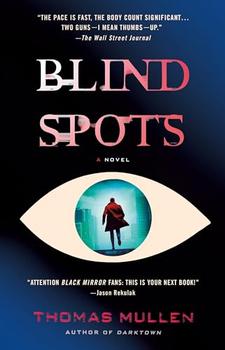Summary | Excerpt | Reviews | Beyond the book | Read-Alikes | Genres & Themes | Author Bio

A Novel
by Thomas MullenThe events in Blind Spots by Thomas Mullen take place seven years after a mysterious catastrophic event known as the Blinding, in which everyone in the world went blind. When the book opens, many people are outfitted with vidders, wearable technology that allows them to see by having visual data sent to their optic nerve. But as is common with technology, the vidders are controversial.
The main character, Major Crimes Detective Mark Owens, has been on the police force since before the Blinding. He worked during the transitional period before vidders were widely available and remembers the tumultuous time—especially because it coincided with his wife's suicide. Despite his baggage, Owens is driven to work hard and smooth over tensions. When a murder occurs and a witness reports the killer was a "black blur," Owens doesn't believe it until he sees it too. Someone is manipulating vidders to erase themselves, which shouldn't be possible given the technology.
The author is exceptional at creating threads of plot tension that tangle together, leaving me truly excited to find out how it ended. Vision technology is at the heart of most of the conflicts. There's an anti-vidder commune led by a character named Reverend Miriam; there's the EyeTech group (fronted by young tech billionaire Kai Ballantine) that makes and sells the vidders; and a community known as the Embers, where residents are too poor to buy the technology. Detective Owens is at the nexus of these groups, while also dealing with vidder issues related to law enforcement, such as whether the police should be the first to get the most advanced version. I was impressed with how many dimensions of conflict Mullen created related to the vidders.
The other police officers on the force do not believe in the black blurs, and as more murders occur, Owens realizes his safety is at risk. Meanwhile, the president is coming to town, certain to draw large crowds while a murderer is on the loose. I can't remember the last time I was so excited to keep turning the pages, and I felt increasingly anxious as the plot deepened. It helps that the author has created characters with enough depth to be compelling. I was touched when Owens' girlfriend, a fellow cop, visits her sister in prison and wonders if she could do more to help her. I also felt empathy reading about Owens' late wife, an artist like me, whose suicide left Owens with unanswered questions.
Naturally, this book has a lot of parallels to the era of COVID-19—including conflicts over vaccinations and the role of law enforcement. The wage gap and digital divide are starkly visible in the novel as well: "The gap between have and have-not is more of a chasm when the unfortunates can't even see," Owens thinks. While the author brings up these important issues, he's not didactic or condescending.
Perhaps my favorite part of the book is the detail with which Mullen constructs this new era. He answers pretty much every question that a reader could have, and even questions nobody would think of. We learn about post-Blinding sleep, crying and circadian rhythms. The detectives say that while gun homicides have been reduced, strangulation murders are more common. A drug called Opsin that gives users bright visual hallucinations has claimed many lives. Most crimes begin with the perpetrator destroying the victim's vidder to prevent identification. And, in a nice touch, EyeTech's office displays a poster of the eyeball from Luis Buñuel's film Un Chien Andalou.
Beyond the technology and crime at the forefront of this story, Mullen reminds readers of our metaphorical blind spots. When we're close to someone, do we overlook certain warning signs? Can we really see those closest to us most clearly? And, in our quest to be seen, are we overlooking things? As Owens wants to tell his partner, "It's a new twist on the tree-falls-in-a-forest question. You reveal a part of yourself to a person, to just one person...The act of revealing yourself changes you, maybe, but only in the other person's eyes and your own. And if the other person's eyes are gone...then that old self of yours might not exist anymore." In its more philosophical moments, Blind Spots asks us to consider what perception is and how we take it for granted.
While a lot of authors write suspenseful thrillers, Blind Spots stands above many for its intricate world-building and smartly crafted characters. The author resolves the main plot points in satisfying ways, but some elements aren't as nicely tied up. Even now, with the biggest mysteries solved, I keep thinking of the characters. If I had a vidder that would let me see into their futures, I would use it without hesitation.
![]() This review was originally published in The BookBrowse Review in May 2023, and has been updated for the
March 2024 edition.
Click here to go to this issue.
This review was originally published in The BookBrowse Review in May 2023, and has been updated for the
March 2024 edition.
Click here to go to this issue.

If you liked Blind Spots, try these:

The Last Murder at the End of the World
by Stuart Turton
Published 2025
From the bestselling author of The 7 1/2 Deaths of Evelyn Hardcastle and The Devil and the Dark Water comes an inventive, high-concept murder mystery: an ingenious puzzle, an extraordinary backdrop, and an audacious solution.

by Robert Jackson Bennett
Published 2024
A Holmes and Watson–style detective duo take the stage in this fantasy with a mystery twist, from the Edgar-winning, multiple Hugo-nominated Robert Jackson Bennett
Your guide toexceptional books
BookBrowse seeks out and recommends the best in contemporary fiction and nonfiction—books that not only engage and entertain but also deepen our understanding of ourselves and the world around us.